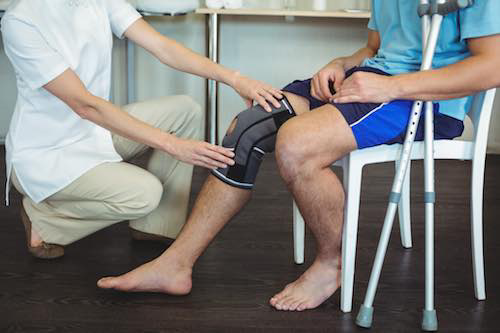What is Orthopedic Physiotherapy?

Orthopedic physiotherapy stands at the forefront of rehabilitation, focusing on the assessment, diagnosis, and treatment of musculoskeletal conditions. This specialized branch of physiotherapy focuses on restoring optimal movement, function, and quality of life for individuals, who are ailing with orthopedic issues. From injuries to chronic conditions, orthopedic physiotherapy plays a vital role in the recovery and management of musculoskeletal disorders.
Conditions Treated by Orthopedic Physiotherapy
Orthopedic physiotherapy concentrates on addressing musculoskeletal ailments affecting bones, joints, muscles, ligaments, tendons, and nerves. It encompasses a range of conditions, including but not limited to:
- Post-Surgical Rehabilitation: After orthopedic surgeries like joint replacements, ligament repairs, or spinal surgeries, physiotherapy aids in regaining strength, flexibility, and mobility.
- Sports Injuries: Treatment and rehabilitation for various sports-related injuries, such as sprains, strains, tendonitis, and fractures.
- Chronic Conditions: Management and pain relief for conditions like arthritis, osteoporosis, and chronic back or neck pain.
- Traumatic Injuries: Rehabilitation for accidents, trauma, or fractures to restore normal movement and functionality.
- Muscle Imbalance or Weakness: Addressing muscle imbalances, weakness, or poor posture to enhance stability and prevent further injuries.
- Degenerative Conditions: Managing conditions that worsen over time, such as degenerative disc disease or joint degeneration.
The Role of Orthopedic Physiotherapy:
At the heart of orthopedic physiotherapy lies a comprehensive approach to healing and recovery. From post-surgical rehabilitation to managing chronic conditions, this discipline focuses on assessing, diagnosing, and addressing a wide spectrum of musculoskeletal disorders. Orthopedic physiotherapy optimizes physical well-being and quality of life through personalized treatment plans.
Key Aspects
- Assessment: Thorough evaluation of the patient’s condition, including physical examination, range of motion tests, strength assessments, and analysis of movement patterns.
- Individualized Treatment Plans: Designing tailored treatment programs based on the assessment findings and the patient’s specific needs and goals.
- Therapeutic Exercise: Prescribing exercises to improve strength, flexibility, endurance, and joint mobility, aiding in recovery and preventing future injuries.
- Manual Therapy: Hands-on techniques like joint mobilizations, soft tissue massage, and manipulation to restore joint mobility and reduce pain.
- Modalities and Techniques: Utilizing modalities such as ultrasound, electrical stimulation, heat/cold therapy, and laser therapy to alleviate pain and promote healing.
- Patient Education: Educating patients on injury prevention, ergonomics, and self-management strategies to enhance their understanding and active participation in their recovery process.
- Functional Training: Implementing activities and exercises that mimic daily tasks or sports-specific movements to facilitate a safe return to normal activities or sports.
Benefits of Orthopedic Physiotherapy:
Orthopedic physiotherapy offers numerous benefits to individuals dealing with musculoskeletal issues:
- Pain Management: Effectively alleviates pain through various techniques, reducing the reliance on pain medications.
- Improved Mobility: Enhances flexibility, range of motion, and overall mobility, enabling individuals to perform daily activities more comfortably.
- Enhanced Strength and Function: Builds strength and improves functional abilities, aiding in a quicker and more comprehensive recovery.
- Prevention of Recurrences: Addresses underlying issues and educates patients on preventive measures to reduce the risk of future injuries.
- Faster Recovery: Facilitates faster recovery post-surgery or injury, optimizing the healing process and minimizing downtime.
- Improved Quality of Life: Restores independence and improves the overall quality of life by enabling individuals to engage in activities they enjoy.
Conclusion:
Orthopedic physiotherapy plays a pivotal role in managing and rehabilitating various musculoskeletal conditions. It promotes healing, restores function, and enhances overall well-being. Whether it’s recovering from an injury or managing chronic pain, the tailored approach can help you achieve optimal physical health and functionality.
Consulting with a qualified orthopedic physiotherapist is essential for accurate assessment, personalized treatment plans, and guidance throughout the rehabilitation process. They helps you address your individual needs and goals. After all, orthopedic physiotherapy aims to empower individuals to lead active, pain-free lives and regain control over their musculoskeletal health.
Blog Categories
- Acupuncture Treatment (10)
- Ankle Sprain (1)
- Arthritis Treatment (1)
- Back Pain (23)
- carpal tunnel (2)
- Chiropractic Care (39)
- Tennis Elbow (1)
- Chronic Pain (7)
- COVID-19 (1)
- Custom Orthotics (6)
- Dizziness (4)
- Exercises (13)
- Foot Orthotics (6)
- Hamstring Stretches (2)
- Info Articles (3)
- Kids Injury (1)
- Laser Therapy (4)
- Massage Therapy (21)
- Neck Pain (17)
- Orthopedic (1)
- Osteoarthritis (5)
- Osteopathy (3)
- Pain Management (21)
- Physiotherapy Benefits (44)
- Physiotherapy Clinic (6)
- Physiotherapy Exercises (12)
- Physiotherapy Tips (25)
- Physiotherapy Treatment (101)
- Rotator Cuff (2)
- Shin Splints (1)
- Shoulder (2)
- Spine (4)
- Sports Physiotherapy (2)
- Uncategorized (1)
- Vestibular Physiotherapy (2)
- Work From Home (2)



